本ホームページは「JavaScript」が使われております。 「JavaScript」をONにしてご利用ください。
Embassy of Japan in the United States of America

Visa and Travel Information

- If you need a visa, check how and when you can apply for a visa: General Rules & Processing Time
- If you do NOT need a visa, skip to STEP #6 .

Visa Information
Who needs a visa.
- The Visa Waiver Program applies based on your nationality, NOT on your U.S. residence status (including green card).
Back to Top
General Rules for Visa Application
Application procedure & processing time.
- In general, it takes 5 business days to issue a visa. (ex., If you apply on Monday, you can pick up a visa next Monday. Our holidays are not counted as business days.)
- It may take more than one month depending on the visa. We recommend that you apply for a visa approximately 1.5 months before your departure date. We do NOT have expedited services.

Types of Visas & Application Documents
- Please click on the applicable box below to see application documents on each visa.
- If you intend to stay in Japan more than 90 days, please click on the "COE Holders" box.
- The online application for a short-term tourism visa ( single entry only, and only for the purpose of tourism ) is available. For further information, please click on the “Short-term Tourism/Business/Study” box below.
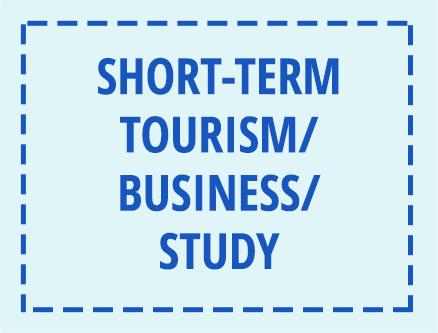
Application drop-off/pick-up & payment Hours
- No appointment required.
- No parking available.
- Please check our holidays before visiting.
- In case of adverse weather conditions, Embassy of Japan follows the guideline of U.S. Federal Government. When the U.S. Office of Personnel Management (OPM) announces federal agencies in the Washington, D.C. area are "closed" or "delayed", Embassy of Japan along with VISA section will be closed/delayed accordingly.
- The Embassy will NOT accept any applications by mail.
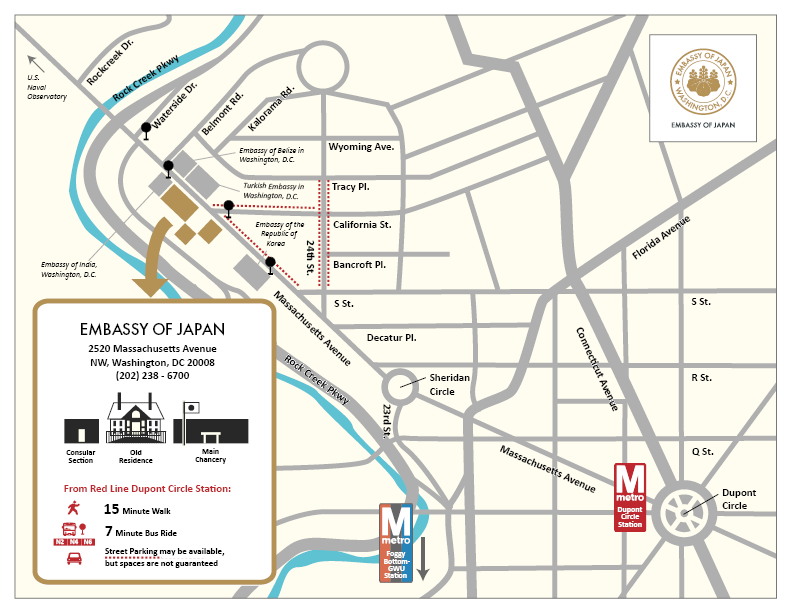
- US citizens are exempt from visa fees. (Some countries and regions are also exempt from visa fees. Please check the Visa Fee Exempt list to find out if your visa fee is waived. )
- Applicants who have applied for a visa online are required to bring a printed copy of “Registration Information Form” to the Embassy for your payment (payment is only acceptable in the afternoon). *Applicants who has applied for evisa (online visa) on or after 10th July are eligible for online payment ( Details / Video ).
- We accept CASH only. We DO NOT accept personal checks and credit cards.
Information on Border Measures
Covid-19 travel guidelines.
- On-arrival surveillance for travelers and returnees with COVID-19 symptoms has been conducted since 12:00 am (JST) on May 8, 2023.
- Insurance Before Entrance
- Guidebook for when you are feeling ill
Visiting Japan
- After April 29, 2023, pre-registration for quarantine procedures on Visit Japan Web are no longer required, however, you can still use Visit Japan Web to pre-register for "Immigration", "Customs" and "Tax-free Shopping Service" (Optional).
- For information about traveling with minor(s), please read our FAQ .

Staying in Japan
- Be aware of traffic rules in Japan
- Nice to Meet You! Let's Be Friends!
- Study in Japan
- Japanese pension law
- Information on Local Call Centers
- It is a CRIME to sell or give a bank account without just cause.
- Roadmap for the Realization of a Society of Harmonious Coexistence with Foreign Nationals
- Comprehensive Measures for Acceptance and Coexistence of Foreign Nationals
- A daily life support portal for foreign nationals
- Guidebook on Living and Working
- New to Japan? Useful pages for foreign nationals

Recommended Information
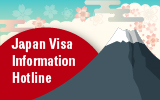
- Consular Section: Embassy of Japan, 2520 Massachusetts Ave. NW, Washington, DC 20008
- Office Hours: Application Drop-off/ M-F 9:15am-12:00pm Visa Pick-up/ M-F 1:30pm-4:00pm
- Contact Us: 202-238-6800/ M-F 9:00am-5:00pm
- Japan Visa Information Hotline (Available in English/Vietnamese/Russian/Ukrainian) 1-202-499-1468 Domestic call fee applies, 24hours, 7days/week
Temporary Visitor Visa
Who can use a temporary visitor visa, temporary visitors for business.
(1) The visa application form (see Documentation #1 below). (2) A valid passport (see Documentation #2 below). (3) A photo (see Documentation #3 below). (4) A certificate of completion of registration for the ERFS.
Additional documents may be requested.
Temporary Visitors Visiting Relatives or Acquaintances (*) *Only those who are deemed to have a relationship equivalent to relatives (betrothed or common-law marriage) or those who are deemed to have a need to visit Japan (to attend a wedding or funeral or to visit an acquaintance who is ill).
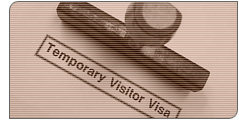
Visa Exemption
U.S. citizens and citizens of other countries which have a reciprocal visa exemption arrangement with Japan may be eligible to visit Japan without a visa for a short-term stay for the activities allowed to Temporary Visitors. For more information about reciprocal visa exemption arrangements, please click here . Important Notice :Border enforcement measures to prevent the spread of novel coronavirus (COVID-19)
Documentation
Please be aware that we will decline applications that have incomplete documents. Each Temporary Visitor Visa applicant must submit the following documents: * Consulate General of Japan will not make copies. If you need original documents, please bring the original plus one copy.
- An application form completed and signed. Blank forms are available at Japanese consular offices. You can also download by clicking on visa application form ( Sample ) in PDF format. Chinese citizens must write their names in Chinese characters, as well as in Roman letters. Korean citizens in principle are asked to write their names in Chinese characters, as well as in Roman letters. Please include your e-mail address and contact phone information. An applicant with an arrest or criminal record must provide a copy of his/her court and/or arrest record (including cases that ended with an acquittal or pardon), along with an English translation of those documents if they are in any language other than English. Even if the case did not go to trial, please provide a letter that explains in detail the circumstances surrounding the arrest. We would like to know about the charges, time served, fees paid, and probation (if any).
- Valid passport ( original plus one photo copy of the face page) with sufficient space for a visa (This means at least one empty, blank visa page. US passports use the rear pages for amendments, and are not acceptable as blank visa pages ). If you already have a valid Japanese visa in your passport, please include a signed consent form as shown in the sample at this link: http://www.ny.us.emb-japan.go.jp/en/d/Consent.pdf . If you submit a PERMIT TO REENTER THE UNITED STATES or a REFUGEE TRAVEL DOCUMENT issued by the U.S. government, it must have a validity date at least six months beyond the date of visa application.
- A passport-sized photograph: 2-inch x 1.4-inch photograph on glossy photo paper taken within the last six months with plain background. Photograph may be attached to the application form with glue (not tape or staples) or you may submit the photograph unattached.
- Green Card or valid I-94 and U.S. resident visa to re-enter the United States (F or J visa holder must show an I-20 or DS-2019 with the valid signature of an appropriate official in order for re-entry). If you will be entering a third country after leaving Japan, you must show a valid visa to enter that country (or a national passport of that country). We ask that all applicants submit their original immigration documents (green card, I-20, etc.) or a NOTARIZED copy of the documents. * Please note: In principle we do not accept an application from B-1 and B-2 U.S. visa status holders.
- A confirmed reservation record of your round-trip flight to/from Japan. An e-ticket or print-out from a travel agency, airline or travel website is acceptable. The print-out should include: -Your name. -Your confirmation number/record locator. -Your airlines, flights and all departure and destination cities. -Your complete round-trip flight itinerary, starting and ending in the US. This should include all of the countries you are visiting other than Japan, if applicable. * Please note: We do not require the purchase of tickets, but we do require a confirmed reservation. We are not responsible for tickets which may be unusable due to the delay or denial of a visa. For those with non-revenue ticket holders: a) Actual Non-Revenue ticket (original plus copy of all pages), plus a printed entire flight information from the airline company b) A copy of the employee ID of the airline employee who obtained the flight coupon, or a letter from the airline proving the employee works for the airline, and that the applicant is authorized to use the non-revenue ticket
- If traveling for BUSINESS, original letter from applicant’s company signed by an authorized executive officer, on company letterhead, stating: a) applicant’s position in the company, duration of employment, and monthly or annual salary b) nature/purpose of visit in detail c) dates/duration of stay intended d) contact person, company name, address and phone number of business contact in Japan e) guarantee of financial support during applicant’s stay in Japan and return transportation from Japan * Additional documents may be requested during the course of examination.
- If going to attend a CONFERENCE, conference brochures plus a paid registration form and invitation will be required. In addition, a letter from the home institution/company giving the circumstances of the trip as in 6.a ) ~ 6.c ) from the visa applicant’s home institution/company, plus the applicant’s financial resources such as listed on 8.a) will be required.
Visa Fees Visa fees are determined according to reciprocal arrangements between Japan and the country of the applicant's nationality. Click here for Visa Fees.
Processing Time Please refer to our introduction page .
Applications by mail Please refer to our introduction page .
Note for Chinese nationals In general, Japanese Embassy/Consulates in China are not accepting Japanese tourist visa applications from Chinese nationals residing in other countries, and if you are planning to sightsee in Japan during your temporary stay in China or on the way back to the US, we recommend applying for a Japanese visa before leaving the US.
Note for Nationals of India Click here for outline of application procedures for Multiple Entry VISA ( English / Japanese )
Note for Nationals of Indonesia, the Philippines, and Vietnam Click here for outline of application procedures for Multiple Entry VISA ( English / Japanese )
- Tours & Experiences
- Tailor-made Trips
- Bahasa Indonesia
We are happy to see you again!
Continue with
Or use email.
No Account? Create one
Create account
Already have an account? Sign in
Quickly Sign up with
I agree to Japan Travel's Terms of Service and Privacy Policy . Terms of--> and acknowledge that Japan Travel's Privacy--> applies to me.-->
Email reset password link
Please check your inbox and click the link we will send to you.
A Guide to Japanese Visas
A general overview of the Japanese visa system

Every foreign national entering Japan must possess a valid visa. Whether that visa is issued on arrival or applied for in advance is based on what type of "residence" the visitor is seeking.
Below is a brief introduction to some of the visa categories for visitors coming to Japan. For specific questions and more detailed information, it is always best to check with your local Japanese embassy/consulate or the immigration bureau in Japan.
Covid-19 is changing the travel landscape fast, including rules on temporary visas due to imposed restrictions. Check with your local Japanese embassy for the latest details, and follow our coronavirus updates .
Temporary Visitor Visa
Most visitors to Japan can enter the country on a temporary visitor visa, or tourist visa, thanks to visa exemption agreements between Japan and many foreign countries.
For residents of over 60 countries (a full list can be found here ), a fee-free 90-day visa is issued upon arrival. This requires no advance paperwork and amounts to being merely a landing permission stamp in the traveler’s passport. Visitors from a few select countries (including Thailand, Brunei and Indonesia) are permitted to enter Japan on a 15-day fee-free visa and 30 days for the United Arab Emirates
Visitors of certain nationalities (Austria, Germany, Ireland, Liechtenstein, Mexico, Switzerland or the United Kingdom) who enter Japan on a 90-day visa can extend their stay in the country by up to six months. Those interested in this option would need to apply for an extension—usually after the halfway mark of an existing visa—at the nearest immigration bureau in Japan.
Student Visa
Those who would like to attend university or language courses in Japan that last longer than 90 days should apply for a student visa.
Most universities and schools will be able to assist potential students with the application process. An application usually needs proof of enrollment at a host institution and evidence that a student can capably support themselves financially during the term of study.
Students who hope to seek part-time employment to supplement their savings while in Japan would have to apply for special permission from the local immigration bureau.
Most student visas are issued for a term of three months to just over 4 years. This can be extended if the student can prove he is still enrolled.
Working Holiday Visa
Citizens of 23 countries/regions (France, Germany, Austria, Slovakia, UK, Ireland, Portugal, Denmark, Norway, Taiwan, Hong Kong, South Korea, Canada, Australia, New Zealand, Poland, Hungary, Spain, Argentina, Chile, Iceland, Czech and Lithuania) can enter Japan on a working holiday visa.
This status allows visitors to pursue part-time work for up to a year in Japan. This visa is not intended for full-time positions, but rather for a series of short-term opportunities.
To apply for this program, visitors must be between the ages of 18 and 30 (both inclusive at the time of visa application) however the condition of age may be different depending on the applicant's issued country. They are required to hold citizenship in one of the aforementioned countries, and submit the following documents for consideration:
- Submit both the required form and a CV (resume)
- Supply proof that you possess sufficient funds to support yourself
- Register at the embassy of your home country upon arrival in Japan
More information can be found at the Ministry of Foreign Affairs Working Holiday official site and the Japan Association for Working Holiday Makers website (which also has a very useful job posting board).
Those who wish to engage in paid, full-time activities in Japan must enter the country with a valid work visa. Work visas are issued based on what area or field you will be working in during your time in Japan (i.e. journalism, business management, the arts, teaching, engineering, entertainment, etc). If you change jobs within Japan to a different field, it is necessary to apply for a different type of work visa.
Work visas are issued mostly to those who have either advanced degrees (university level or higher) or who possess a significant amount of experience in their field. It helps greatly to have a company "sponsor", showing that you have potential (or guaranteed) employment upon arrival.
Work visas are generally issued for a period ranging from four months to five years and are renewable.
In some cases it is possible to switch from another visa type to a work visa from within Japan if the applicant meets the required conditions — check the Application for Change of Status of Residence page on the Immigration Bureau of Japan website.
Other Visas
Several other visa categories exist that don't fall into the major categories above. These include the SOFA visa (for military members stationed in Japan or on orders), investor visa, and skilled foreign worker visa.
For more details on those visas, as well as the ones mentioned above, please contact your local Japanese consulate or see the Ministry of Foreign Affairs website for guidance. For information regarding Specified visas such as Spouse or Child of a Japanese national please check this page on the Ministry of Foreign Affairs website.
Contact Information
- Inquiries about visa examination status: Inquiries can be made only for cases in which the application documents have been transferred to the Ministry of Foreign Affairs in Tokyo from Japanese Embassies or Consulates where the visa application was initially lodged. Monday to Friday from 10:00-12:00 and 14:00-16:00.
- Other inquiries about visas: Monday to Friday from 09:00-12:30 and 13:30-17:00. Note: The automatic answering machine service is available only in Japanese (open 24 hours).
- Essential Guides
- Share on Facebook
- Share on Twitter
- Copy link to share
By Mandy Bartok
Community writer
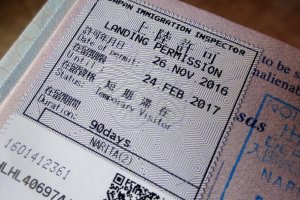
Information
03-5501-8431
Top Articles
- Recommended

Currency Conversion & Exchange Rates

Art Meets History at Sannomaru Shozokan

2-Day Hachijojima Retreat: Recharge Your Mind and Body

Asakusa Shutter Art

The Ultimate Guide to Thrifting in Tokyo

Uber Ride-Hailing Services Are Now Available in Japan

Only in Japan: Character Cafes in Tokyo

Kodaira, Honjo City, a Place of Faith and Rich in Nature

Extraordinary Experiences in the Great Nature of Izu-Oshima, the Closest Island From Central Tokyo

Guide to Bringing Medicines Into Japan

Your Name: Real-Life Locations in Tokyo

Hachiko Statue in Shibuya

Iwatayama Monkey Park

Shibuya Crossing

Daikoku Car Meet

Guide to PASMO Cards

Guide to Suica Cards

NAKED Sakura Festival

Kanamara Penis Festival
More from this category, guide to bringing medicines into...
By Japan Travel

Money in Japan
By Tom Roseveare

Guide to Earthquakes in Japan
By Edward Yagisawa

Getting a Tattoo in Japan
By Serena Ogawa
Join the discussion

Let us know how we can help.
Help us improve JapanTravel.com
We welcome any suggestions regarding this content. Your feedback is confidential and will be used to help improve this page.
Suggest an edit
https://en.japantravel.com/guide/japan-visa/34951
Thank you for your support!
Your feedback has been sent.
Visa Traveler
Exploring the world one country at a time
Japan Tourist Visa: Requirements and Application Process
Published: March 18, 2024
A Japanese tourist visa is required for all non-visa-exempt nationalities and those who are not eligible for eVisa. Japan tourist visa application can only be lodged in person at a Japanese embassy in your country of nationality or residence.
Quick summary:
- Who requires it: Foreign nationals that are not visa-exempt
- Validity: 3 months, single-entry
- Allowed stay: up to 90 days
- Extensions: not allowed
- Processing time: 5 business days
- Fee: 3000 JPY or less
Read the Japan Visa Guide for more general advice about available visas for tourists, eligibility, and procedures.
Table of Contents
Understanding japan tourist visa.
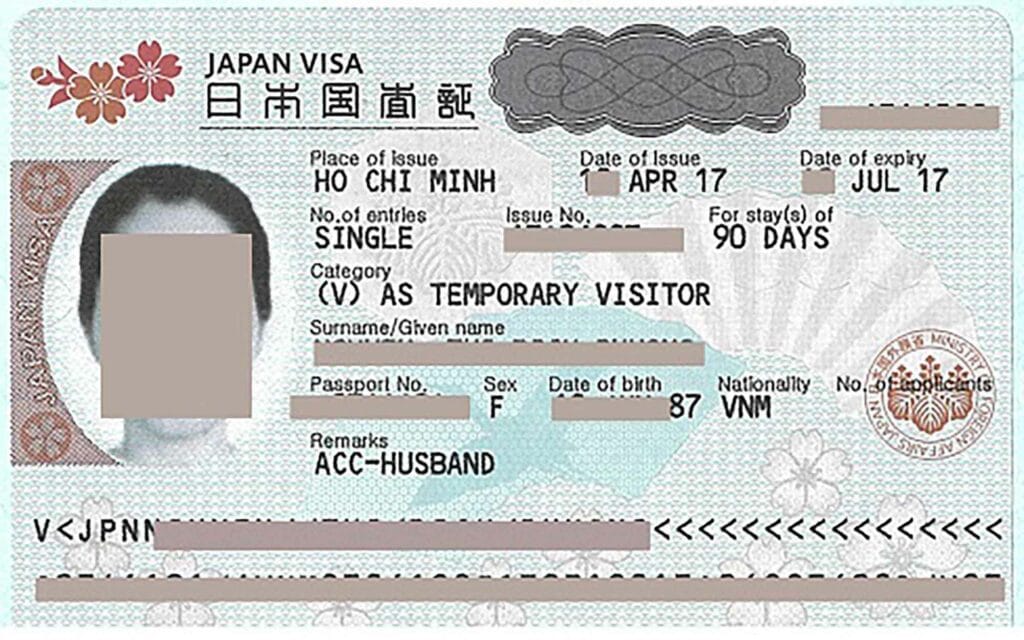
Tourist visa validity
Japan single entry visa is valid for 3 months. You cannot extend this period of validity and if you change your passport before you use it, you must apply for a new visa.
Duration of stay
In most cases, the duration of allowed stay inside Japan is 90 days. In some cases, it can be lower, about 15 or 30 days.
Allowed number of entries
The standard Japanese tourist visa is a single entry only.
Multiple entry tourist visas are also issued but only to select nationalities with additional requirements.
Allowed ports of entry
With a Japanese tourist visa, you can enter Japan at any international airport or seaport.
When to apply
The processing time is 5 business days after the visa application is deemed complete by the receiving embassy. This can in turn take a few extra days or even up to 2 weeks.
It can take even longer if additional documents are requested from you or your application is sent for further review. Apply well in advance to ensure you receive the visa before your travel dates.
- Earliest : 3 months before traveling
- Latest : 2 weeks before traveling
Tourist visa extension
Extensions are not possible for either visa validity or allowed duration of stay.
Benefits of Japan tourist visa
Japan tourist visa offers VISA-FREE access to 14 countries. Read the VISA-FREE countries for Japan visa for more details.
Japan Tourist Visa Requirements
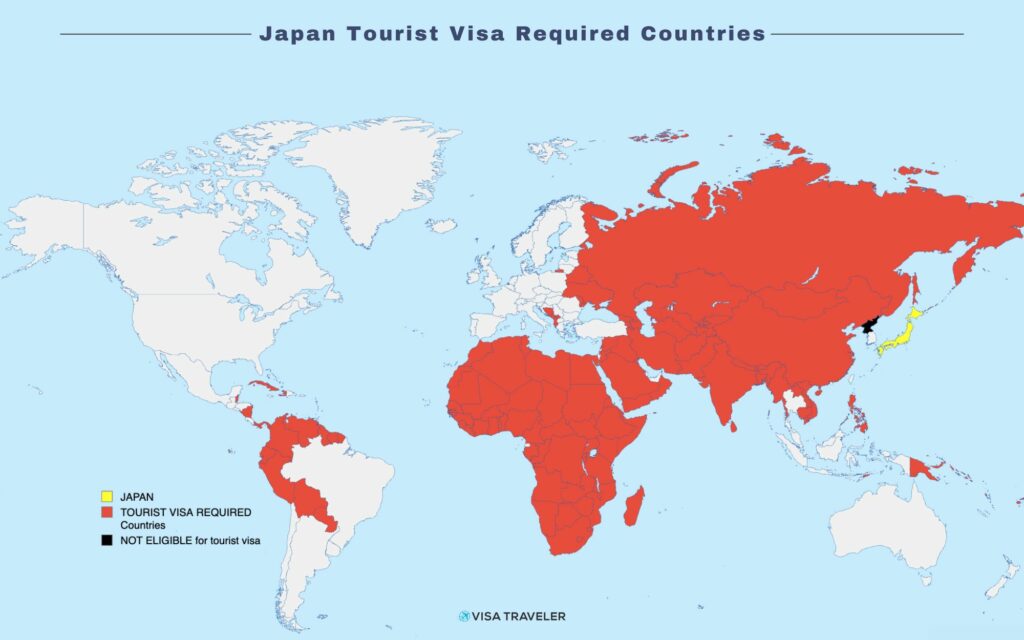
Who requires a tourist visa
The following nationalities require a tourist visa to travel to Japan
- Nationalities that are NOT visa-exempt (currently, 70 countries are visa-exempt)
- Nationals that are NOT eligible for Japan eVisa (currently, nationals and residents of 14 countries are eligible for eVisa)
North Korean nationals are not eligible for Japanese visas and are always denied entry.
Documents required
The following are the required documents for a Japan single entry visa for individual tourists (not on organized tours through travel agencies):
- Passport valid for the duration of stay
- One passport-size photo
- Completed Visa Application Form (use Adobe Acrobat Reader to fill out the Visa application form digitally, then print it and stick the passport photo)
- Confirmation of reservation of tickets (air or sea) both to and from Japan OR Information about the planned schedule of flight or cruise, including entry and departure dates both to and from Japan
- Proof of sufficient funds – certificate of income or tax statement AND bank statement
- Travel Itinerary plus any tickets or leaflets supporting your travel plans
The documents may vary depending on the receiving embassy and you may be requested to submit additional ones.
NOTE There are minor differences in the required documents for independent tourists from China, Russia, CIS countries, Georgia, and the Philippines. These are listed below.
Chinese travelers
Generally, Chinese tourists visiting Japan come on tours organized by authorized travel agencies.
As an independent Chinese traveler, it is possible to obtain a tourist visa for Japan if you have sufficient financial capability.
You must prepare your own travel itinerary in advance and approach an approved Chinese travel agency to facilitate and lodge the visa application for you. There is currently no way to apply at a Japanese embassy in China independently.
The period of stay granted for tourist visas to Chinese nationals is usually 15 or 30 days.
Travelers from Russia, CIS Countries, and Georgia
Independent tourists from any of the CIS (Commonwealth of Independent States) countries, Russia, or Georgia traveling to Japan, can obtain a single-entry visa.
The required documents are more or less the same as for other countries but you must submit 2 Visa Application Forms and 2 photos.
Travelers from the Philippines
In addition to the general document requirements, you must also submit:
- Birth certificate issued by the National Statistics Office (PSA) on security paper. If the certificate is illegible, crumpled, or parts of it are missing, also submit a birth certificate from the local government.
- Marriage certificate (if married)
Photo requirements
The passport photo must meet the following requirements.
- Taken within the last 6 months
- Must be of size 45mm x 35mm
- In color against a plain white background
- Taken looking straight forward and face visible clearly
- On a good quality paper
Tourist visa fee
The fee for the Japan tourist visa is 3000 JPY payable in the local currency of the embassy where you apply.
Visa fees may be lower for some countries.
Online payment for the visa fee is not possible.
Crucially, you don’t need to pay the visa fees when you apply. You will pay only if your Japan visa is approved. Japan is one of the few countries in the world that charge visa application fees after the visa is issued and don’t charge for unsuccessful applications.
Processing time
The processing time is 5 business days.
However, this period starts after the embassy confirms that your application is complete which is known to take a few days or longer.
In reality, you can expect your visa to be issued within 2 weeks in most cases.
Japan Tourist Visa Application Process
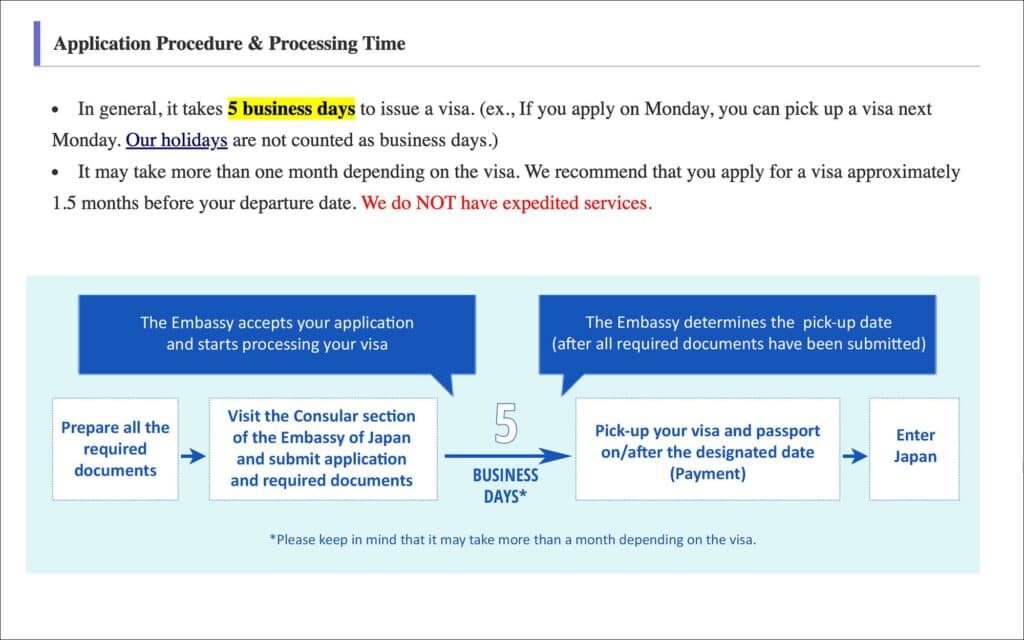
How to apply for a Japan tourist visa
You must apply at a Japanese Embassy or Consulate General with jurisdiction over the area where you live or the one with jurisdiction over the country in which your passport is issued.
Effectively, this means that you must apply in the embassy in your own country or the country where you are legally a resident .
If there is no Japanese embassy in your country, see which embassy nearby has jurisdiction over your country – it’s usually the closest one in a neighboring country. Check the Japanese embassies and consulates around the world.
Applying for Japan tourist visa at the embassy is usually a 5 step process.
Step 1: Gather all the necessary documents.
Step 2: Apply in person at the Japanese embassy.
Step 3: Remain available to reach – the embassy may request additional documents or an in-person interview.
Step 4: If your application is successful and your visa issued, go back to the embassy to collect your passport
Step 5: Pay the visa fee in cash in the local currency
If your application is rejected, you won’t be able to apply for a tourist visa again for the next 6 months unless there are major changes to your circumstances. There are no other penalties and there is no fee to be paid.
How to contact the Japanese embassy or consulate
Check the website of your Japanese embassy . They have methods of contact listed on their websites.
Alternatively, reach out to the Japan visa information hotline at [email protected] with your nationality or residence and inquiry.
Entry Procedure at the Border
Regardless of the border you enter Japan at, your flight origin, or your nationality, the entry procedure in Japan is pretty much always the same.
The border officer will check that you meet all requirements, including that your visa is valid, your purpose for entering Japan, and the planned length of your stay.
Assuming everything is in order, the officer will grant you “landing permission” by affixing a seal of verification for landing in your passport. At this point your visa expires and you are allowed to stay in Japan for up to 90 days (or as much as provided in your visa).
Frequently Asked Questions (FAQs)
Is japan visa easy to get.
The Japanese tourist visa is one of the easiest to obtain. There are relatively few required documents, no mandatory interviews, and a high success rate.
If you submit a complete and honest application, the chances of visa approval are high.
Can I apply for a Japan visa online?
Japan also has an eVisa system in place but it’s available only to certain travelers.
You can apply for a Japan visa online (eVisa) if you are a legal resident of Australia, Brazil, Cambodia, Canada, Saudi Arabia, Singapore, South Africa, Taiwan, UAE, the UK or the USA.
A legal resident can be anyone residing in those countries on a student visa, work visa, residence permit, etc.
What is the minimum bank balance for Japan tourist visa?
There is no official guideline for the minimum required bank balance but a rule of thumb is to have at least 100 USD for each day of intended stay in Japan.
For example, if you submit an itinerary for a 15-day trip to Japan, you should show a minimum of 1,500 USD balance in your bank account.
WRITTEN BY THIRUMAL MOTATI

Thirumal Motati is an expert in tourist visa matters. He has been traveling the world on tourist visas for more than a decade. With his expertise, he has obtained several tourist visas, including the most strenuous ones such as the US, UK, Canada, and Schengen, some of which were granted multiple times. He has also set foot inside US consulates on numerous occasions. Mr. Motati has uncovered the secrets to successful visa applications. His guidance has enabled countless individuals to obtain their visas and fulfill their travel dreams. His statements have been mentioned in publications like Yahoo, BBC, The Hindu, and Travel Zoo.
PLAN YOUR TRAVEL WITH VISA TRAVELER
I highly recommend using these websites to plan your trip. I use these websites myself to apply for my visas, book my flights and hotels and purchase my travel insurance.
01. Apply for your visa
Get a verifiable flight itinerary for your visa application from DummyTicket247 . DummyTicket247 is a flight search engine to search and book flight itineraries for visas instantly. These flight itineraries are guaranteed to be valid for 2 weeks and work for all visa applications.
02. Book your fight
Find the cheapest flight tickets using Skyscanner . Skyscanner includes all budget airlines and you are guaranteed to find the cheapest flight to your destination.
03. Book your hotel
Book your hotel from Booking.com . Booking.com has pretty much every hotel, hostel and guesthouse from every destination.
04. Get your onward ticket
If traveling on a one-way ticket, use BestOnwardTicket to get proof of onward ticket for just $12, valid for 48 hours.
05. Purchase your insurance
Purchase travel medical insurance for your trip from SafetyWing . Insurance from SafetyWing covers COVID-19 and also comes with a visa letter which you can use for your visas.
Need more? Check out my travel resources page for the best websites to plan your trip.
LEGAL DISCLAIMER We are not affiliated with immigration, embassies or governments of any country. The content in this article is for educational and general informational purposes only, and shall not be understood or construed as, visa, immigration or legal advice. Your use of information provided in this article is solely at your own risk and you expressly agree not to rely upon any information contained in this article as a substitute for professional visa or immigration advice. Under no circumstance shall be held liable or responsible for any errors or omissions in this article or for any damage you may suffer in respect to any actions taken or not taken based on any or all of the information in this article. Please refer to our full disclaimer for further information.
AFFILIATE DISCLOSURE This post may contain affiliate links, which means we may receive a commission, at no extra cost to you, if you make a purchase through a link. Please refer to our full disclosure for further information.
MORE VISA GUIDES

UNITED KINGDOM

VIEW ALL VISA GUIDES
- Cookie Policy
- Copyright Notice
- Privacy Policy
- Terms of Use
- Flight Itinerary
- Hotel Reservation
- Travel Insurance
- Onward Ticket
- Testimonials
Search this site
Ultimate Guide to Japanese Visa
By Camilla Vigotti and Yuki Kobayashi Purwanto | April 28, 2022
Moving to a new country for work or study is a thrilling experience. Once you get your Japan Visa, you will be able to fly to Japan and start a new life. The only obstacle in this process is bureaucracy. Getting all of your paperwork ready to issue your Visa can be extremely stressful and confusing. Not only are there documents and forms you need to correctly fill in, but you also have to go through different offices as well. Moreover, because of the current pandemic, there have been some changes in immigration policies that require additional steps, prepping, and paperwork.
In this Ultimate Guide, we will provide all the necessary information for you to get your Japanese Visa without too much stress.
This article is a part of our extensive series on Japanese Culture and Online Japanese Lessons at Japan Switch.
Note: This article does not provide legal advice. If required, please refer to a Visa expert such as Tsuyoshi Kawaguchi or an attorney.
2 Ebooks to Jump Start your Japanese
Subscribe to our newsletter to get bi-weekly study tips, advice and stories on how YOU can improve your Japanese.
What Are The Requirements to Get a Visa in Japan?
There are different types of visas in Japan that you can apply for depending on your purpose, economic situation, skills, and country of origin. When it comes to migration, each country has different policies and agreements with Japan so it's important that you are aware of what relationship your country has.
We will get into details on the different main types of Visas later on, but for now, the general idea is that if you meet one or more of these requirements you are eligible to apply for a Japan Visa.
What if you don’t meet any of those requirements?
If you don’t meet any of the previously mentioned requirements for a Japan Visa, fear not because there are other options that you can consider.
Option 1: Getting Your Japanese Visa Through Your Spouse
If your spouse already has a working Visa, you can apply for a Dependents Visa in Japan . This Visa will allow you to work only part-time, which means 28-hours a week.

Option 2: Apply for a Specified Skills for Work Visa
Due to the labor shortage that Japan is facing, the government introduced the new Specified Skills for Work Visa (特定技能 / tokutei ginou ) . This Visa allows foreigners to work in pre-selected industries for up to five years. To apply for this Visa you need a minimum of an N4 level of Japanese proficiency. Depending on the industry, you might need an N3 or higher. But, a convenient aspect is that you don’t need a university degree.
The following table shows the kinds of jobs you can apply for the Specified Skills for Work Visa with.
Affordable Online and Offline Morning Lessons in Tokyo
Learn Japanese with us online or offline and make your Japan Switch.
- Affordable Japanese Lessons
- Monthly Contracts
- No Entrance Fees
- No Hidden Fees
- 200+ Students
- Online or Offline Lessons
Option 3: Become a Diplomat
If you have diplomatic duties, you can apply for a Diplomatic Visa . The period of stay depends on the length of the mission. This Visa is usually available for ambassadors, diplomacy staff, military, and military-civilian contractors.
Option 4: Be Your Own Boss
If you are a freelance or self-employed person that makes more than 190,000 yen, you can try to apply for a Self-sponsorship Visa . A similar alternative is an Entrepreneur or Start-up Visa , however, you will need a consistent amount of capital (approximately 5 million yen) or investors that can sponsor both your business idea and Visa in Japan.
Note: The amount you need to make MAY vary depending on where you live. It’s best to speak with a visa consultant before applying for this kind of visa.
Option 5: Study Under a Master
If you are a student of an organization with a recognized “master”, you can apply for a Cultural Activities Visa . This special Visa allows foreigners to be one of the few elite students of a master's in a cultural or artistic discipline such as martial arts, ikebana (flower art arrangement), tea ceremony, poetry, and so on. This Visa also includes unpaid internships and religious activities.
If you want to start learning about some Japanese cultural activities, check out our Gide to Japanese Poem .
How Do You Apply for a Japan Visa?
Applying for a Japanese visa is a process that involves your local Japanese embassy and a supporting institution (or person) in Japan that is sponsoring you such as a university, language school, or company. Because of this, the whole process can take up to 5 months, so it is important to carefully plan your journey ahead of time.
Due to Covid-19, this process might take even longer. We recommend that you contact your nearest Japanese embassy or consulate to get an estimated time.
What do you need to do?
Preparing the required documents for your japan visa.
First of all, you need to prepare all the necessary documents. Depending on the type of Japan visa that you are applying for and your country of origin, you might need other documents on top of the standard ones. Make sure to check your local Japanese embassy or consulate website.
In general, you will need to provide:
- Your original passport.
- Visa application form (available on your Japanese embassy’s website).
- One photograph (35mm x 45mm)
Submitting your Japan Visa application
Second, you will need to submit your documents. If you are going in person, the whole process will only take a day. You can schedule an appointment via phone or email.
If you are sending your documents by mail, your Japanese visa will be issued within 3 to 5 business days. However, with delays, it can take up to two months. Remember that when you are sending your application through the post office, you must include a pre-paid envelope/stamp/etc so the staff processing your Japan Visa application can send your passport with the visa back to you.
After submitting, your application will go through a process of careful examination. In case there are any errors, missing documents, or information you will be contacted by the staff at the embassy or consulate. You might also be contacted if your Japan visa application requires an interview (such as the Japanese spouse and dependent visa). Within 5 months , you will know if your Japanese visa was successfully issued or not and your passport will be returned to you.
Certificate of Eligibility: What is it?
The Certificate of Eligibility (COE) is a necessary document for many types of Japanese visas such as a student visa, working visa, or spouse visa. A COE shows the government that you are eligible to receive a visa. The document is issued by the Regional Immigration Bureau before a visa application.
Applying for a COE for your Japan Visa
To get a COE you will have to complete an application offered by a sponsoring institution that will hand it in, along with the other necessary documents, to the Japanese immigration. You can apply and submit an application for a COE even if you are already in Japan as well. Issuing the COE can take anywhere up to 3 months. Once it is ready, it will be sent to you via mail. You will need to include the original copy of your COE along with a photocopy in your visa application.
Japan Visa During the Covid-19 Pandemic
Because of the current situation with Covid-19, Japan has issued New Border Measures for foreigners who apply for a new entry to Japan and returnees. Since 2020, there have been a variety of changes, so what the procedure is right now, might not be the same as in a few months so be sure to check your embassy website or contact them to confirm that borders are open and if there are any new requirements.
New documents you need for your Japan Visa:
- Entrants, Returnees Follow-up System (ERFS) is a system overseen by the health ministry. The visa sponsors (such as universities and language schools) will share applicants’ information via the ERFS who will receive a certificate of compilation that visa applicants must include in their visa applications. Japan Switch can help sponsor you if you need an ERFS Certificate. Contact us for more information (and a free level check + consultation). For more information, read our Guide to the ERFS Certificate .
- Written Pledge for traveling individuals to ensure that they will abide and respect quarantine restrictions. Your sponsoring institution will provide you with this document.
Learn Japanese for Free
Our newsletter for beginner to low intermediate Japanese students will get you on the right track to learning Japanese and saving money.
How Long Does a Typical Japan Visa Last?
Usually, a Japanese visa is valid for 6 months, 1, 3, or 5 years. Your period of stay depends on your purpose for coming to Japan. Your first visa will be valid for one year but you might receive a longer period depending on your university program and the amount of tuition you paid.
Your second-issued Japanese visa can vary. If you are changing jobs it will most likely be issued for one year, if you are renewing for the same company you have been working at, chances are that it will be issued for 3 years or longer.
Japanese Student Visa
A Japanese Student Visa is available for all the students who wish to attend a recognized educational institute such as Japanese schools, trade schools, and universities (undergraduate, MA, Ph.D., and research).
If you are planning to enroll in a Japanese language school, be aware that there are certain conditions. You can attend a language school for a minimum of 6 months and a maximum of 24 months, afterwards, you will not be able to renew your Japanese student visa.
There are plenty of Japanese language schools across Japan, make sure to check BFF Tokyo’s Find the Right Japanese School in Tokyo for the best tips.
If you wish to stay longer in Japan you have two choices:
- Finding a full-time job and converting to a working visa
- Advance your academic career and enroll in a university as a student. In this case, you will need to apply for a Japanese Student Visa again which will last until your graduation with potential renewal in between.
3 things you need to remember about a Student Visa in Japan
First, your Student Visa can be revoked at any point if you don’t pay your tuition.
Second, you are allowed to work 28 hours per week while on a Japanese Student Visa, however, you must get permission first. To do so, if you are already in Japan, you have to submit a formal application to the migration office. The form is titled “application for permission to engage in activity other than the permitted under the status of residence previously granted” or 資格外活動許可申請書/ Shikakugaikatsudōkyoka shinsei-sho and is available on the Immigration Services Agency of Japan’s website.
Once approved, your residence card ( zairyu card) will show that you are allowed to work. If you are coming to the country, at the non-residential passport area inside the airport you can submit a form on the spot along with your documents to allow you to work. The officer will hand you your brand new zairyu card with the stamp.
Learn more about zairyu card in our Ultimate Guide to Zairyu Card.
Third, schools usually recommend you to study for a minimum of 6 months because it is easier to issue a Japanese Student Visa rather than transition from a tourist visa to a student visa.
Japanese Holiday Working Visa
The Japanese working holiday visa is a mix between a tourist visa and a working visa. You get enough time to enjoy what the country has to offer and work for up to 40 hours per week. To apply for this visa, your country of origin must have an ongoing agreement with Japan. Currently, 26 countries are holding the program. You can check the current list of eligible countries on the Ministry of Foreign Affairs of Japan website.
Requirements for a working holiday visa in Japan?
To apply for a working holiday visa, applicants must be between 18 and 30 years old (in most cases) with a minimum of $2,500 in savings available to cover the initial cost of staying, plus enough money to issue a return ticket to the country of origin.
Moreover, applicants must travel alone without dependents or children, must be in good health, and must be a first-time applicant for a working holiday visa in Japan. If you have already been issued this visa in the past, you will not be eligible for it a second time.
Be careful with choosing your job
Another thing to keep in mind is that lots of companies require you to have approximately 9 months left on your Japan visa. If you have only a couple of months left, the chances of finding full-time employment will be extremely low.
You are also NOT allowed to work at bars, cabarets, clubs, nightclubs, or gambling establishments. If you are found working for one of these establishments, you will face immediate deportation under the Immigration Control and Refugee Recognition Act. You might also face criminal charges for promoting illegal work or selling of persons.
Want to explore career options outside of teaching English?
Break free from the teaching trap! Tune into the Japanese With Friends Podcast to hear from real professionals, CEOs, consultants, and experts on honing .
Countries of exceptions
As mentioned above, there are currently 26 countries that have an ongoing agreement with Japan to issue a working holiday visa. However, some of these countries have certain restrictions and exceptions to formal rules (must be between 16 and 30 years old, must travel alone, must have enough funds to cover the expenses for the first few months and a return ticket).
The table below shows which countries have expectations for applicants for the working holiday visa.
If the working holiday visa route seems right for you and you just want to test the waters,, read more in the BFF Tokyo Ultimate Guide to Working Holiday in Japan .
Japanese Working Visa
A Japanese working visa is one of the hardest visas to obtain. It allows you to be hired full-time in a variety of sectors with no limitation on the maximum hours per week. The nice thing about a working visa is that your employer will assist you in the process. Your company or workplace will sponsor your Japanese visa and might submit your application to the Immigration Office for you. Keep in mind that the immigration office can still reject the applications in certain cases, such as if you don’t have a university degree.
The Ministry of Foreign Affairs in Japan offers a list of occupations that are eligible for a working visa in Japan along with extra documents that you might need to provide for your applications. The list of documents includes passport, photo, COE, documentation of personal work history, workplace description (such as registration, statement of loss and profit), and description of the job position at the workplace (role, salary, established working hours).
The table below shows some examples of jobs available and the documents necessary for your Japan visa.
Finding a job is not easy, regardless of the country. There are many resources you can count on such as specialized websites such as GaijinPot, networking apps like Linkedin, and job fairs. If you are a student attending a Japanese University, you can rely on the career center for some help. Otherwise, read our Ultimate Guide to Full-Time Jobs in Japan .
Your Japanese leaving people in the dark?
Let our newsletter for beginner to low intermediate learners guide your way.
Start Learning Today
Loopholes for a working visa in Japan
If you don’t have a university degree, you can still work in Japan via a Specified Skills Working Visa, Self-employed Visa, and Start-up Visa that we previously covered.
Otherwise, if you have a lot of experience in your professional field, you can apply for a Skilled Labor Visa. The number of years of experience that you need depends on the field and job type. It can be as little as 3 years and as long as 10 years. Moreover, you might have to provide certificates of employment ( 在職証明書, zaishoku shoumeisho ) for all of your related working experiences (in your specified field).
Examples of jobs that fall under the Skilled Labor Visa are: chef (in a particular food/cuisine of a foreign country), sommelier, jeweler, animal trainer, pilot, engineer (IT), specialists in humanities, and internal services, and so on.
Japanese Tourist Visa
A Japanese Tourist Visa is for foreign nationals who plan to stay in Japan for 90 days or less for reasons such as:
- Sightseeing
- Visiting relatives, friends, or a sick person
- Attending a wedding or funeral ceremony
- Participating in athletic tournaments/contests,
- Business purposes (such as market research, business liaison, business consultation, signing a contract, or providing after-sale service for imported machinery).
Tourists can stay in Japan for up to 30 days under the single-entry law, however, this tourist visa is valid for up to 90 days. Tourists can also apply for a double-entry visa, which allows them to go for two short excursions in six months. It's worth noting that the Japan tourist visa prohibits tourists from working for a living while in the nation.
Keep in mind tourists who are visiting Japan, must first get a tourist visa before entering the country. Nonetheless, Japan exempts a number of nations from having to follow this rule. For example, citizens of most European nations, the United States, Australia, and Argentina do not require a Japanese tourist visa since they are visa-exempt for tourism reasons. Nationals from any of those regions are granted Temporary Visitor status, which allows them to stay in Japan for up to 90 days without requiring a visa.
What Documents Do I Need for a Japan Tourist Visa Application?
When you submit a Japanese Tourist Visa application, you need to have several supporting documents. The Japan Tourist Visa requirements are:
- Completed and signed the Japan Tourist Visa Application Form The application form may be downloaded from the Japan Ministry of Foreign Affairs' website ( here ). Fill in all of the blanks. If none of these apply to you, put "N/A" instead of leaving the field blank.
- Passport (must be valid for at least six months and at least 2 blank pages for the visa to be affixed in)
- Flight Itinerary
- Daily Itinerary
- Residence Certificate (if you are a foreign resident of Japan)
- Bank statements (if you are financing your own trip)
- Latest Income Tax Returns (ITR)
- If you're paying a visit to someone (a friend or family member), bring documentation of your relationship, such as:
- Relatives/Family members (Civil status documents, such as birth or marriage certificates)
- Friends (Photos, receipts, phone numbers, and a note outlining your friendship)
How can I obtain Japan Tourist Visa?
A Japan Tourist Visa must be obtained via a Japanese Representative Office overseas (Embassy or Consulate) or an approved travel agency. The following is a summary of the application procedure for a Japan Tourist Visa:
1. Make an appointment with the Japanese Embassy or Consulate to submit your application.
2. Individual applications are not accepted by several Japanese embassies, thus you must apply through a travel agency. On your behalf, the agency will submit the application to the Embassy or Consulate.
3. Obtain the necessary documentation for a visa to Japan (see them below)
4. Submit the necessary documentation to the Embassy/Consulate or a travel agency.
5. Allow time for the visa application to be processed. Starting the day the Japanese Representative Office receives your completed application, this normally takes 5 business days.
6. Pick up your passport from the embassy/consulate/travel agency. If your application is granted, your visa will be issued and you will be able to go to Japan within three months of receiving it.
Do I need a Vaccine Passport?
Yes, you do. Keep in mind that since March 2022, Japan has been accepting applications for so-called vaccine passports from people who have been fully vaccinated against COVID-19, which allows them to travel internationally to certain destinations without having to quarantine.
The vaccination passports, which are available in both Japanese and English, are designed to enable Japanese citizens to evade strict travel restrictions overseas as other countries around the world implement similar procedures to ease the return of business travel and tourism.
A Japanese vaccination passport will include the following information:
- Date of birth
- Type of vaccination (passport number)
- Vaccination dates
- The city in which it was issued
How can I obtain a Vaccine Passport?
Vaccine passports can be applied for in person or by mail, with the government planning a computerized application mechanism at a later date. The records will be available for free, and the administration is working on getting them out on the same day the application procedure would initially differ based on the municipality. You will also need several documents such as:
- Vaccine passport application form
- Vaccination voucher
- Proof of vaccination
Which countries need a tourist visa to enter Japan?
All non-visa-exempt nations must get a visa to enter Japan. For vacation or commercial purposes, citizens of certain nations can come with a Temporary Visitor status for a limited length of time (15 to 90 days).
Here are the countries that require a Japanese tourist visa in order to enter Japan:
- Philippines
There are also other types of short-term stay visas such as business visas and transit visas.
Business Visa
A business visa is a temporary business visa that allows you to remain for up to 90 days and can be used for single or double entry (if both trips are within a 6-month period). Conferences, meetings, contract signing, and market research are all examples of business reasons.
Transit Visa
A transit visa is for those who plan to stay in one country for the night before continuing on to another. If a visa for the third country is necessary, please get it before applying for a Japanese transit visa.
Stop wasting time.
Download your free copy of 29 TIPS + TRICKS TO HACK THE JLPT today and start preparing for the JLPT the right way!
How can I sign up for a Japan Tourist e-Visa?
The electronic visa is part of the Japanese government's plan to have 60 million foreign tourists each year by 2030. But, due to the COVID-19 pandemic, the launch of the Japan Tourist e-Visa has been postponed until further notice. See your embassy’s website for more information on whether it has been opened up again.
The online application form is simple to fill out. Foreign visitors will need a valid passport in order to complete the e-Visa registration for Japan. It will be necessary for the visitors to provide their personal details including:
- Date & place of birth
- Contact information
The system will gather an applicant’s personal and passport information to automatically evaluate the details provided. So the online visa systems help to determine a traveler’s eligibility.
The e-Visa will be emailed to applicants once their application has been filed and accepted. Travelers will be allowed to enter the country by presenting their e-Visa at the border. The e-Visa will also be single-entry, and payment by credit or debit card will be required to submit the application.
Japanese Spouse Visa
The Spouse (Dependents) Visa is for any Applicant who will come to Japan as the spouse, unmarried child, or other dependents of a foreigner. You may be eligible for a Japan marriage visa, also known as a spouse visa if you are married to a Japanese citizen . Individuals who wish to stay in Japan for up to three years can apply for these visas, which can be renewed if necessary. Spouse visas can be issued for lengths of either 6 months, 1 year, 3 years, or 5 years.
If you haven't already arrived in Japan, you'll need to apply for a spouse visa at your nearest Japanese embassy. Those who are already in Japan should submit an application to the Japanese Immigration Bureau. You can check this hyperlink that includes a list of immigration bureaus in each area .
What are some important considerations after I receive my Spouse Visa?
Japanese tax for holders of spouse status of residence (sor).
Spouse (Dependents) SOR is essentially a non-working category, you will have very little interaction with Japanese taxes in most circumstances. However, you might be able to get authorization to do some limited part-time work in some instances. In such instances, your employer will likely manage the majority of your Japan tax concerns. This can be accomplished by monthly withholding tax deductions and a year-end adjustment made as part of the December paycheck.
If you have many jobs or have additional sources of income, you may be required to file a Japanese tax return by the 15th of March each year. Because there are no extensions available, it is critical that you understand your Japanese tax responsibilities. Complying with your Japanese tax obligations is essential in order to renew your visa.
Taxes when the holder of Spouse (Dependents) SOR leaves Japan
The holder of a Spouse (Dependents) SOR must fully pay her taxes or engage a tax agent before leaving Japan.
It's also worth knowing that Japanese local taxes are calculated depending on where you live on January 1st of each year. As a result, leaving Japan before the 1st of January may save you money in taxes.
What are the types of spouse visa applications and how can I apply for them?
Application for Certificate of Eligibility (COE) and Application for Change of Status of Residence are the two types of applications for a spouse visa. An application for a Certificate of Eligibility is a request to bring a foreign spouse who lives outside of Japan to Japan. On the other hand, an application for a spouse visa is filed by a foreigner who is in Japan on a visa other than a spouse visa and marries a Japanese person or (special) permanent resident.
Application for Certificate of Eligibility
The first thing you will need to do is to apply for a Certificate of Eligibility (also known as a Zairyu Shikaku Nintei Shoumeisho) in Japanese. This can take some time to complete, but having the certificate ready when you apply for your spouse's visa can make the process go much more smoothly.
To get your Certificate of Eligibility as a spouse of a Japanese national, you’ll need a completed application form, one photograph (4cm long x 3cm wide), a family register of the Japanese nationals (stating that they are married to you), marriage certificates issued by an institution in your home country, letter of guarantee from your Japanese spouse, and a completed questionnaire giving evidence of your marriage. The application forms as well as information for the sponsor are available on the Immigration Services Agency’s page .
Keep in mind that you also should contact an embassy if your Japanese spouse lives outside of Japan and is unable to get a certificate of eligibility in Japan.
When submitting a visa application to an immigration office, a foreigner seeking a spouse visa must go to the immigration office on his or her own. However, because it is difficult for a person residing abroad to travel to an immigration office, an application agent, who is designated by an ordinance of the Ministry of Justice for each status of residence, can submit an application on their behalf. In the case of a spouse visa, for example, "a relative of the foreign citizen resident in Japan" might act as an agent. Please keep in mind that people who are not linked to the person, such as friends, are not eligible to serve as an application agent.
The period of examination takes about 1 to 3 months. That is why it is important to prepare the application for the Certificate of Eligibility carefully, considering such a period of examination.
Application for Change of Status of Residence
Before the date of expiration of the status of residence and after the occurrence of the reason for the change of status of residence.
The effective creation of a legal marriage is the reason for the change of resident status.
If you want to convert your status of residence to a spouse visa because you married your partner, you can apply for a spouse visa at any time between the day you started dating your spouse and the date your present status of residence expires.
Just like the Certificate of Eligibility above, for the Application for Change of Status of Residence, administrative scriveners who have submitted a notification to the Director of a Regional Immigration Bureau after completing an application agency training and taking an examination are permitted to submit applications to immigration offices on behalf of applicants or agents of applicants.
A person who intends to alter his or her status of residence must go to the appropriate immigration office and file an application on his or her own. If the individual is unable to attend owing to illness or other circumstances, a relative living with the person can act as an agent to complete the application. The examination period takes about 2 weeks to 1 month.
Get a FREE Consultation and Level Check
Sign up for online or offline lessons with Japan Switch and we will find the class best suited for you!
What happens to my spouse visa after a divorce in Japan?
If you're a foreign national with a spouse visa/status of residence in Japan and you're getting a divorce, you're probably worried about what will happen to your spouse visa when the divorce is finalized. Don't worry, because we will go over everything you need to know about changing your visa status after a divorce.
If you are curious and want to know more about divorce in Japan, make sure to read our article that covers Everything You Need to Know About Divorce in Japan.
If you divorce your Japanese spouse or get divorced, you must notify the Immigration office within two weeks . The Ministry of Justice website has a Notification of Relationship with Spouse form that you can download or access by clicking here . Then, you need to bring the completed paperwork to the local Immigration office to have your divorce formally registered.
The law was changed in 2012 so that a foreign spouse of a Japanese person who gets divorced can no longer stay in Japan until their spouse's visa expires. After 6 months have passed since your divorce, the immigration office will withdraw your spouse's visa. That is why you must file a petition for a change of resident status during this 6-month grace period, or you will be forced to leave Japan at the conclusion of the time. If you want to stay in Japan after your divorce, you'll need to file a petition for a change of status of residence because your spouse's visa will expire within 6 months.
Switching your Japan Visa after a divorce
If you are presently employed, your employer may be willing to sponsor a working visa for you. On the other hand, if you have lived in Japan long enough (about 5 years) or if you have a child of Japanese nationality to raise in Japan, you may be able to change your spouse visa to a "Long Term Resident" visa. Keep in mind that the kid must be under the age of 18 and you must have parental authority (child custody) over the child for the prior condition to apply.
So basically, a spouse visa is valid for 6 months after the divorce is filed, and if you want to stay in Japan longer than that, you must file a petition for a change of status of residence. Since the foreign national's status of residence is granted by the Minister of Justice's discretion. You could apply for a Long-Term Resident visa, if you have lived in Japan for 5 years or more, or if you have a child of Japanese nationality under the age of 18.
Advice from a certified Visa Consultant
On our podcast "Japanese with Friends," we had the pleasure of interviewing Tsuyoshi Kawaguchi of HYGGE Visa Office, a qualified Japanese visa adviser. In the podcast, we had a talk about many of the issues that foreigners have concerning the visa application procedure once they have their paperwork ready. You can also listen to the podcast here.
What are some common mistakes foreigners in Japan make on their visa application?
Although it is simple, applicants must supply accurate information. In his recent experience, applicants should be careful of "consistency" between their most current applications and the previous ones.
When applying for the work extension visa, you will complete the necessary documentation and provide any evidence necessary. Inspectors will review everything they have (including what may be in their database) and, if they find a single discrepancy, they will require you to write a letter explaining the discrepancy. Some areas of concern have been:
- Name of university
- Graduation date
- Name of your company or previous companies
- Dates (regarding employment contracts, termination contracts, company joining dates, etc).
Keep in mind that inspectors can be quite strict with the process. They may simply reject the application owing to inconsistencies without hearing from the applicant. Once an application has been refused, it is extremely difficult to reverse the situation or obtain future acceptance. That is why visa applicants must constantly be cautious and provide accurate information at each application.
What tips do you have for people doing self-sponsorship in Japan?
Mr. Kawaguchi tends to get a lot of questions regarding self-sponsorship. In fact, many freelancers and ordinary firm employees are covered by a general working visa, the "Engineer/Specialist in Humanities/International Services'' visa. The most important requirement for obtaining a self-sponsored visa is that the applicant receives money from clients on a regular and consistent basis. They must also ask one of their clients to serve as their "visa sponsor."
According to Mr. Kawaguchi, even though the visa applicant is not a firm employee, they must request an application form with company information and present tax records.
Clients such as freelancers, business consultants, web designers, engineers, and other professionals sent photocopies of contracts with a few organizations and requested cooperation from their primary customers with the visa application.
He is also frequently asked about the minimum monthly income as a visa specialist. On SNS, many people say things like "3 million yen every year," "250,000 yen per month," and so on. There is no publicly available information, however, 200,000 yen per month is the very least in his experience. “For example, if you get 600,000 yen from a customer in the next three months for a three-month project, you will be good on a monthly basis”.
Tsuyoshi Kawaguchi, a registered visa consultant (immigration attorney for Japanese visas) with over seven years of experience in Tokyo and over 3,000 visa applications under his service, wrote this information. If you're interested and want to know more about using his services, you may contact him through his LinkedIn profile or his website, Hygge Visa Japan .
What exactly do you do as a visa specialist?
Gyoseishoshi , his work title, and license name is a legal profession in Japan. They basically prepare documentation, file government licenses and permissions, and give legal guidance. They are not attorneys and are unable to represent consumers in legal proceedings both inside and outside of the courtroom. They are believed to be able to handle over 2,000 different forms of official papers. In Japan, there are over 50,000 Gyoseishoshi attorneys, each of whom has a specialization. Mr. Kawaguchi is an expert in visas and immigration. There are around 8,000 to 9,000 Gyoseishoshi licensed to handle visa affairs, including himself.
How do you help foreigners?
Mr. Kawaguchi provides English counseling services through email, phone, and face-to-face, as well as a list of required papers in both English and Japanese, so that his clients may correctly correct paperwork from the firm and public agencies such as city offices and tax offices. After the preparation, he would file the visa applications on behalf of his customers, so that they do not need to visit the Immigration Office.
Is it faster to process my Visa through you?
The answer is no, the Immigration examination duration is the same. Even if you ask him or any other professional, there is no way to shorten the time it takes for the visa to be processed. Visa applications are simply examined on a first-come, first-served basis by the Immigration Bureau. The difference is that Mr. Kawaguchi will give suitable information and techniques to ensure that the process runs smoothly and that mistakes such as a lack of paperwork do not create delays.
From Beginner to Pro
Our bi-weekly emails for beginners to low intermediate students will give you the tips and motivation to self-study Japanese your way to Japanese fluency.
What is the immigration experience like for you (special line, special privileges)?
As visa specialists, they have a significant amount of responsibility, both positively and negatively. Why? because visa applications have the potential to transform applicants' lives in the future. Needless to say, they must constantly use extreme caution. “The best part is that my consumers are happy and satisfied with my services when the procedure is done successfully. My clients sometimes treat me like a God, especially when Permanent Residence visa applications are accepted”, as quoted by Mr. Kawaguchi.
They always have a great deal of responsibility, but that is why, not only as visa specialists but also as people, they may have fantastic and priceless experiences. It's a B to C company with a lot of responsibilities. It can be tough to persuade immigration officials to accept visa applications at times. On the other hand, Mr. Kawaguchi thinks that there are very few jobs that bring this kind of priceless experience that customers express great appreciation for.
What type of immigration cases do you normally not accept?
After visa petitions are denied, Mr. Kawaguchi frequently receives several inquiries. The first thing he needs to do is figure out what were the main reasons for rejection. If the reasons are evident and there is a chance of getting a reapplication approved, he will thoroughly explain the situation, the potential, and the risk to his customer. “I take care of the matter if the customer agrees with my explanation. I definitely do not accept candidates who do not meet the basic qualifications. For example, I don't handle Permanent Residence applications unless they meet the Immigration Bureau's basic standards”.
What is the ratio of visa-type processes that you handle?
Approximately 70% of visa applications are for work visas, 10% are for Permanent Residence, 10% are for family visas for spouses and children, and 10% are for other sorts of visas.
What advantages will I get from working with you?
There are three points to consider. First, most visa agents are only open during the day, from 9 a.m. to 6 p.m. on weekdays. However, most people are busy with their jobs. But, Mr. Kawaguchi is a very flexible freelancer that works all year and even in the evenings on a daily basis. It implies that when clients have free time, he may give consultancy services and respond to their queries so that it appears to be customer-friendly.
Secondly, He has worked in this field for over 9 years and has handled over 3,000 instances.
Thirdly, he has a personal experience living in another country, specifically in Spain for a year between 2003 and 2004. Since he didn't speak Spanish very well at the time, he found himself in a lot of tough circumstances. However, he now realizes that knowing how tough it is to live in another country was a priceless experience. Mr. Kawaguchi imagined that for English speakers, Japan is not the most convenient or user-friendly place. He believes that he can comprehend the concerns of non-Japanese people and the hardships of living in Japan because of his experience in another country. “My clients' sentiments and ideas are always respected by me”.
Final Thoughts
Now you know that every foreign national entering Japan must possess a valid visa. Whether that visa is issued on arrival or applied for in advance is based on what type of "residence" the visitor is seeking.
There are several more visa categories that aren't included in the major categories listed above. The SOFA visa (for military personnel stationed in Japan or on orders), the investor visa, and the skilled foreign worker visa are among them. Also, don't forget to contact your local Japanese embassy or consult the Ministry of Foreign Affairs website for further information on such visas, as well as the ones mentioned above.
Related Posts
Learn japanese with friends podcast, guides to learn japanese, guides about japan.
本ホームページは「JavaScript」が使われております。 「JavaScript」をONにしてご利用ください。
Embassy of Japan in Canada
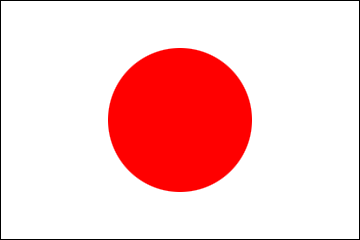
Visa and Consular Section
For specific questions, please direct your inquiries to an appropriate office. Please note that matters related to visas are handled locally according to the jurisdiction of each Consulate-General. If you reside elsewhere in Canada other than the Ottawa region, please direct your inquiries to the office of the respective Consulate-General that takes care of the area where you reside.
Visa Information
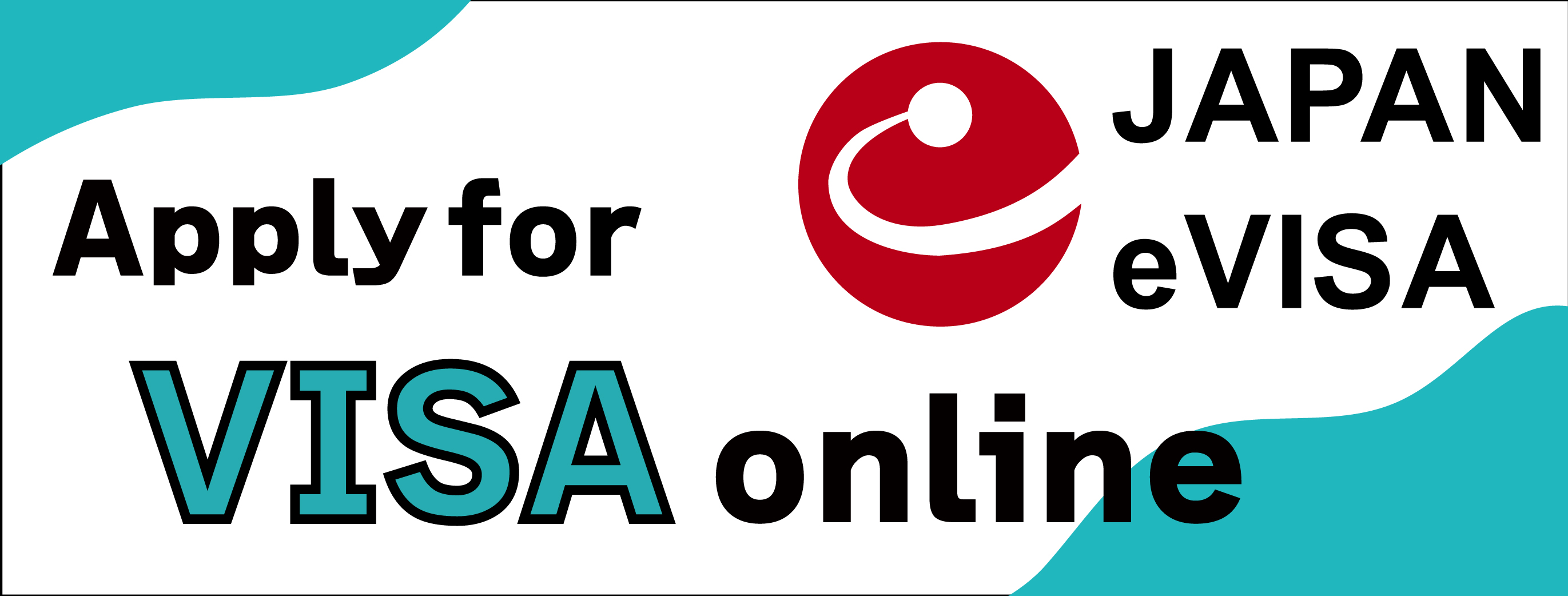
(2) Types of Visa Applications and Requirements
- Temporary Visitor Visa, General
- Transit Visa
- Employment and Work Visa
- Working Holiday Visa
- General Visa
- Spouse or child of Japanese national
- Designated activities (Long Stay for sightseeing and recreation)
- Visa for Medical Stay
- Multiple-entry Visa for Chinese nationals
- Highly skilled professional visa
- Specified visa: Designated activities (Future creation individual, Spouse or Child of future creation individual)
(3) Visa Application Form
(4) Visa Fees
(5) Criteria for Visa Issuance
(6) Visit Japan Web
(7) Japan eVISA website (Online visa application)
● Other inquiries
General Information
Protect your self from potential risks during your trip.
- Overseas travel insurance can give you a feeling of security, even in emergencies, so you can better enjoy your trip.
- Medical expenses can be very high in Japan. If you have purchased travel insurance which offers sufficient coverage of the costs, you can receive treatments without concern.
- It is recommended to purchase overseas travel insurance with travel support for hospital referrals, medical interpretation and cashless medical service. Please check your insurance details before travelling. For example, perinatal medical care is not covered by travel insurance and can be expensive.
- Travel Insurance in Japan (JNTO)
- Travel insurance (Travel.gc.ca)
Other Information
- Request for a Police Certificate
- Japanese Old Age Pension
- Foreign National Coexistence Policies
- To Parents with Children of Japanese Nationality(Notice: Passport Application for Japanese Minors)
Back to Top
We’re sorry, this site is currently experiencing technical difficulties. Please try again in a few moments. Exception: request blocked

Home → Apply Visa → Visa Type
Visa Information
Please select the consular district you live in to learn at which Visa Application Centre you can apply for a visa.
Regions under the Jurisdiction of Japan
Consulate General of Japan, Mumbai
Jurisdiction : Maharashtra, Goa, Gujarat, Madhya Pradesh, Chhattisgarh, Daman, Diu, Dadra and Nagar Haveli
Embassy of Japan, New Delhi
Jurisdiction : Andaman & Nicobar Islands, Arunachal Pradesh, Assam, Chandigarh, Delhi, Haryana, Himachal Pradesh, Jammu & Kashmir, Lakshadweep, Manipur, Meghalaya, Mizoram, Nagaland, Punjab, Rajasthan, Sikkim, Tripura, Uttaranchal, Uttar Pradesh
Consulate General of Japan, Kolkata
Jurisdiction : West Bengal, Bihar, Jharkhand and Odisha.
Consulate General of Japan, Chennai
Jurisdiction : Tamil Nadu, Andhra Pradesh, Telangana, Kerala and Pondicherry.
Consulate General of Japan, Bengaluru
Jurisdiction : Karnataka.
We use cookies on this site to enhance your user experience. If you continue to browse you accept the use of cookies on our site. See our Cookie Policy for more information.
- Media & Industry
- Meetings & Events
- Select Language 简体中文 繁體中文(香港) 繁體中文(臺灣) India (English) Bahasa Indonesia 한국어 ภาษาไทย Tiếng Việt Singapore (English) Philippines (English) Malaysia (English) Australia/New Zealand (English) Français Deutsch Italiano Español United Kingdom (English) Nordic countries(English) Canada (English) Canada (Français) United States (English) Mexico (español) Português العربية Japan(日本語) Global (English)
- India (English)
- Bahasa Indonesia
- Singapore (English)
- Philippines (English)
- Malaysia (English)
- Australia/New Zealand (English)
- United Kingdom (English)
- Nordic countries(English)
- Canada (English)
- Canada (Français)
- United States (English)
- Mexico (español)
- Global (English)
- Fujiyoshida
- Shimonoseki
- Ishigaki Island
- Miyako Island
- Kerama Island
- Tokyo Island
- Koka & Shigaraki
- Hida Takayama
- Ginza, Nihonbashi
- Beppu & Yufuin (Onsen)
- Ginzan Onsen
- Nagasaki Islands

- Kumano Kodo
- Shikoku Karst
- Amami Oshima
- Hachimantai
- Omihachiman
- Aizuwakamatsu

- Diving in Japan
- Skiing in Japan
- Seasonal Flowers in Japan
- Sustainable Outdoors
- Off the Beaten Track in Japan
- Scenic Spots
- World Heritage
- Home Stays & Farm Stays

- Japanese Gardens
- Japanese Crafts
- Temple Stays
- Heritage Stays
- Festivals and Events
- Theater in Japan
- Japanese Tea Ceremony
- Cultural Experiences in Japan
- Culture in Japan

- Local Cuisine Eastern Japan
- Local Cuisine Western Japan
- Local Street Food
- Japan's Local Ekiben
- Japanese Whisky
- Vegetarian and Vegan Guide
- Sushi in Japan Guide
- Japanese Sake Breweries

- Art Museums
- Architecture
- Performing Arts
- Art Festivals
- Japanese Anime and Comics
- Japanese Ceramics
- Local Crafts

- Scenic Night Views
- Natural Wonders
- Theme Parks
- Samurai & Ninja
- Iconic Architecture

- Wellness Travel in Japan
- Japanese Ryokan Guide
- A Guide to Stargazing in Japan
- Relaxation in Japan
- Forest Bathing (Shinrin-yoku)

- Experiences in Japan
- Enjoy my Japan
- National Parks
- Japan's Local Treasures
- Japan Heritage
- Snow Like No Other
- Wonder Around Japan

- Visa Information
- Getting to Japan
- Airport Access
- COVID-19: Practical Information for Traveling to Japan
- Anime Tourism
- Countryside Stays
- Accessible Tourism
- Hokkaido Great Outdoors
- Scenic World Heritage in Tohoku
- Shikoku’s Nature and Traditions
- Southern Kyushu by Rail

- Traveling by Rail
- How to Travel by Train and Bus
- JR Rail Passes
- Scenic Railways
- Renting a Car
- Sustainable Travel in Japan
- Travel Brochures
- Useful Apps
- Online Reservation Sites
- Eco-friendly Accommodation
- Luxury Accommodations
- Traveling With a Disability
- Hands-free Travel
- How to Book a Certified Tour Guide
- Volunteer Guides
- Tourist Information Center

- Japanese Manners
- Spring in Japan
- Summer in Japan
- Autumn in Japan
- Winter in Japan
- Cherry Blossom Forecast
- Autumn Leaves Forecast

- Japan Visitor Hotline
- Travel Insurance in Japan
- Japan Safe Travel Information
- Accessibility in Japan
- Vegetarian Guide
- Muslim Travelers
- Safety Tips

My Favorites
${v.desc | trunc(25)}
Planning a Trip to Japan?
Share your travel photos with us by hashtagging your images with #visitjapanjp
- Visa Application
Travel Tips
AC Bonifacio in Japan
VIEW THIS IN FILIPINO

Top things to remember for first time travelers
Before you have an experience of a lifetime in your Japan trip, you just need to take care of the most important thing first, your Japan Tourist Visa! Below is a guide on how you can apply for your Japan Tourist Visa as well as fulfilling requirements for travelers to Japan.
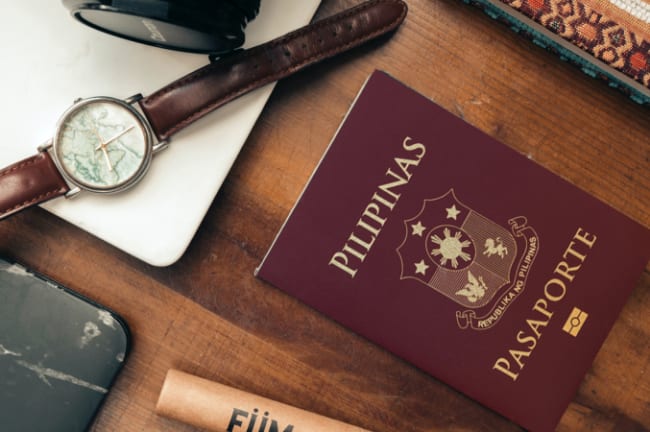
How to Apply for Japan Tourist Visa
Below is a step-by-step guide on how to apply for a Japanese Tourist Visa.
Note: The Japan National Tourism Organization (JNTO) cannot facilitate Visa applications nor can we answer Visa-related inquiries.
For Visa-related inquiries, kindly contact the Japanese Embassy in the Philippines. https://www.ph.emb-japan.go.jp/itpr_en/00_000035.html
- Passport (holder’s signature required)
- Visa Application form (one 4.5cm x 3.5 cm facial photo must be attached)
- Birth Certificate (issued by PSA within one year)
- Marriage Certificate (issued by PSA within one year, for married applicants only)
- Itinerary in Japan
Note: If there is a used Japanese Visa on your passport, birth certificate and marriage certificate are unnecessary.
If applicant will shoulder part/all travel expenses:
- Bank certificate
- Photocopy of Income Tax Return (BIR Form 2316)
If a guarantor will shoulder part/all travel expenses:
- Guarantee letter
- Proof of relationship between applicant and guarantor (e.g. birth certificates)
- Bank Certificate
You can get the application form from The Embassy of Japan in the Philippines website .
Make sure to make extra copies.
You can submit your application form with the required documents through these accredited travel agencies .
The Visa-handling fee for the Japan Tourist Visa varies per travel agency. You must pay the fee after you submit your documents.
The travel agency will contact you if your passport is ready for pickup.
Guides for Entry to Japan
Useful links.
Visit Japan Web
Visit Japan Web is a web service that people entering Japan can use to fast-track Immigration, and Customs procedures in order to enter/return to Japan.

COVID-19 Protocols
Learn everything you need to know about traveling to Japan with COVID-19 protocols.
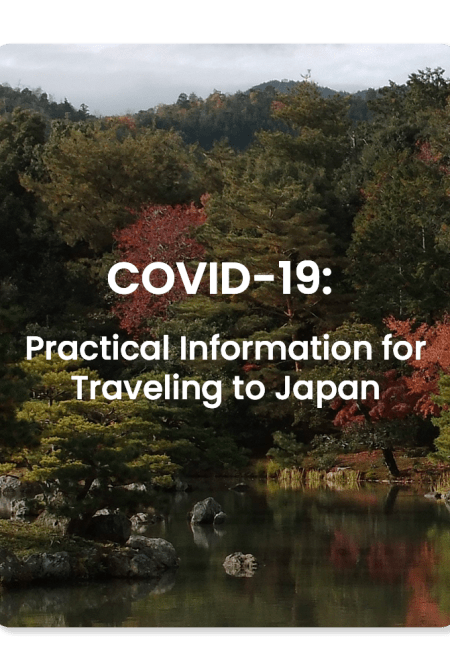
- Irasshaimase
Please Choose Your Language
Browse the JNTO site in one of multiple languages

Japan introduces e-visa for Indian tourists; here's how to apply and more
N ew Delhi: Japan has officially rolled out its e-Visa program through Japan Visa Application centers managed by VFS Global for several countries, including India. This single-entry visa allows a stay of up to 90 days in Japan, tailored for air travelers with ordinary passports starting April 1.
Eligible countries
Eligible countries and regions for the eVisa include Australia, Brazil, Cambodia, Canada, Saudi Arabia, Singapore, South Africa, Taiwan, United Arab Emirates, United Kingdom, and the USA. Indian citizens and foreign nationals residing in India are also eligible.
All the people residing in these countries/regions, except those who are exempted from short-term visa, can apply.
Procedure to apply
- Verification of required visa and documents
- Enter the necessary information for the online visa application
- Receive the visa application results via email
- Pay the visa fees (from 1 April 2024 to 31 March 2025)
Transit visa: Rs 50
- VFS Service fee will be also charged.
- Receive the e-Visa after payment.
Display 'visa issuance notice'
- The new eVisa system requires travelers to show a digital "Visa issuance notice" on their mobile phones upon arrival at the airport, with internet access being essential for this step.
- Travel agency will provide a "Visa Issuance Notice" (printed or pdf data) with a two dimensional barcode.
- Scan the two dimensional barcode with your device and enter the required information to display the notice.
- By tapping “Display“, the electronic "visa issuance notice" appears and the countdown timer shown at the top right starts immediately. This countdown proves that the notice is valid.
- All other formats, such as PDFs, photos, screenshots, or printed copies, will not be accepted.
Important notes
- Japan eVisa is available only to those who travel to Japan by plane.
- During the application process, the applicant may be requested to appear in person at the Japanese overseas establishment with jurisdiction over the place of the applicant’s residence for an interview.
- Only ordinary passport holder is eligible to apply through Japan eVisa website.
For more news like this visit TOI . Get all the Latest News , City News , India News , Business News , and Sports News . For Entertainment News , TV News , and Lifestyle Tips visit Etimes
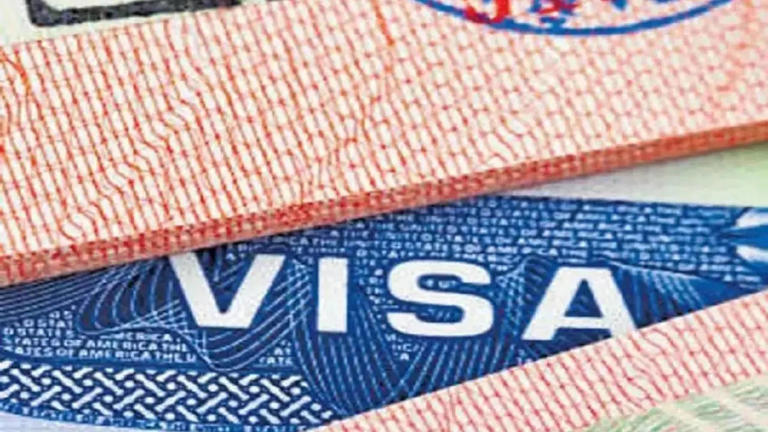
Subscribe Now! Get features like

- Latest News
- Entertainment
- Real Estate
- LSG vs DC Live Score
- TCS Q4 Results Live
- Election Schedule 2024
- Win iPhone 15
- IPL 2024 Schedule
- IPL Points Table
- IPL Purple Cap
- IPL Orange Cap
- AP Board Results 2024
- The Interview
- Web Stories
- Virat Kohli
- Mumbai News
- Bengaluru News
- Daily Digest

Japan introduces e-Visa for Indian tourists: From eligibility criteria to application process, here's a complete guide
Japan has streamlined its visa process for indian travellers with the introduction of evisas. here's your quick guide to the hassle-free application process..
Indian passport holders no longer need to carry a physical visa sticker to travel to Japan. From April 1, Japan began issuing eVisas to Indian travellers. The much-awaited Japan e-Visa programme allows anyone to apply for a visa electronically through Japan Visa Application Centres operated by VFS Global. This programme allows visitors to enter Japan for up to 90 days for tourism purposes.

Under the revised system, applicants must still submit their applications to the Visa Application Centres overseen by VFS Global, which is the same process as before. However, one notable change is in the way visas are issued. Instead of receiving traditional visa stickers affixed to their passports, successful applicants will now receive electronic visas. (Also read: Travelling to the USA for baseball game? Check these 5 best hotels near major league stadiums that can save your money )
The e-Visa process requires travellers to present a 'visa issuance notice' on their mobile device upon arrival at the airport. It's important to note that internet access is required for this process. Any format other than a digital visa issuance notice, including PDFs, photos, screenshots or printed copies, will not be considered valid.
What are the eligibility criteria
Citizens and residents of the following countries and regions are eligible: Brazil, Taiwan, Singapore, United Arab Emirates, South Africa, United Kingdom, Canada, Australia, Cambodia, Saudi Arabia, USA. Additionally, Indian citizens and foreign nationals residing in India are also included in the eligibility criteria. Residents of these countries or regions, with exceptions for those exempt from short-term visas, can apply for an eVisa through the Japan e-Visa website.
How to apply
Here's a step-by-step guide to the application process:
Step 1: To initiate the application process, individuals should access the official website of the Japan Visa Application Centre, managed by VFS Global, by visiting https://visa.vfsglobal.com/ind/en/jpn/.
Step 2: Choose the "Temporary Visitor Visa" option and review all visa requirements carefully. Download the application form, fill it out accurately, and print it. Ensure all fields are completed. Additionally, prepare photocopies of the required documents for the single-entry short-term tourism visa.
Step 3: Schedule an appointment to submit your application at the Visa Application Centre. Once booked, you'll receive a confirmation email for your appointment, which will include the letter of appointment.
Step 4: Submit your completed visa application form at the center during your appointment. Then, wait for an email notification informing you when your decision is ready for collection. You can track the progress of your visa application online using the reference number provided on your invoice or receipt. Approved applicants for the eVisa will receive an electronic visa instead of a physical visa sticker. However, travelers are required to show a "visa issuance notice" on their mobile devices upon arrival at the airport.
Step 5: At the airport check-in, display the "visa issuance notice" on your device. The travel agency will furnish a "Visa Issuance Notice" inclusive of a two-dimensional barcode. Scan the barcode using your device and input the required details to access the notice. Tap "Display" to view the electronic "visa issuance notice."
During the application process, individuals may be required to appear in person at the Japanese overseas establishment with jurisdiction over the applicant's place of residence for an interview.
- Tourist Visa
Join Hindustan Times
Create free account and unlock exciting features like.

- Terms of use
- Privacy policy
- Weather Today
- HT Newsletters
- Subscription
- Print Ad Rates
- Code of Ethics
- Elections 2024
- India vs England
- T20 World Cup 2024 Schedule
- IPL 2024 Auctions
- T20 World Cup 2024
- Cricket Players
- ICC Rankings
- Cricket Schedule
- Other Cities
- Income Tax Calculator
- Budget 2024
- Petrol Prices
- Diesel Prices
- Silver Rate
- Relationships
- Art and Culture
- Telugu Cinema
- Tamil Cinema
- Exam Results
- Competitive Exams
- Board Exams
- BBA Colleges
- Engineering Colleges
- Medical Colleges
- BCA Colleges
- Medical Exams
- Engineering Exams
- Horoscope 2024
- Festive Calendar 2024
- Compatibility Calculator
- The Economist Articles
- Explainer Video
- On The Record
- Vikram Chandra Daily Wrap
- PBKS vs DC Live Score
- KKR vs SRH Live Score
- EPL 2023-24
- ISL 2023-24
- Asian Games 2023
- Public Health
- Economic Policy
- International Affairs
- Climate Change
- Gender Equality
- future tech
- Daily Sudoku
- Daily Crossword
- Daily Word Jumble
- HT Friday Finance
- Explore Hindustan Times
- Privacy Policy
- Terms of Use
- Subscription - Terms of Use

Japan Tourist Visa in 2023: A Comprehensive Guide
Japan tourist visa overview.
Japan Tourist Visa, officially known as a Temporary Visitor Visa, is intended for foreign nationals who wish to visit Japan for tourism, visiting friends or family, or other short-term non-business purposes. The typical length of stay allowed under a Japan Tourist Visa is up to 90 days.
Japan Tourist Visa Requirements in 2023
To apply for a Japan Tourist Visa, you need to meet several requirements:
- Passport : Your passport must be valid for the entire duration of your stay in Japan and have at least two blank visa pages.
- Visa Application Form : A completed and signed Japan Visa Application Form.
- Photograph : A recent passport-sized photograph taken within the last six months.
- Travel Itinerary : A detailed travel itinerary, including information about your accommodation and planned activities.
- Proof of Financial Means : You must demonstrate that you have sufficient financial means to support your stay in Japan. This could be bank statements, employment certificate, or income tax return documents.
- Flight Reservations : Return or onward flight reservations showing your intended departure from Japan.
- Hotel Reservations : Proof of accommodation for the entire duration of your stay.
- Additional documents : Depending on your specific circumstances, additional documents may be required.
See Japan Tourist Visa Requirements .
Japan Tourist Visa Application Process
The process of applying for a Japan Tourist Visa is relatively straightforward:
- Collect Required Documents : Prepare all the necessary documents as per the embassy’s checklist.
- Submit Application : Submit the completed application form and accompanying documents to the Japanese embassy or consulate in your country.
- Pay Fees : Pay the visa application fee. The fee may vary depending on your nationality.
- Collect Visa : If your application is successful, your passport with the visa will be returned to you.
Japan Tourist Visa Costs
As of 2023, the visa application fee for a Japan Tourist Visa is 3,000 JPY for a single-entry visa.
See Japan Tourist Visa Cost .
Japan Tourist Visa Processing Time
The processing time for a Japan Tourist Visa usually ranges between five to seven business days . However, it may take longer depending on the specific consulate or embassy, your nationality, or if further documentation is required.
Japan Tourist Visa Application Form
The Japan Tourist Visa Application form is a critical part of your visa application. It can be found here . It is a two-page document requesting specific details about you, your travel, and your purpose of visit. Here are the main sections:
- Personal Information : This includes your full name, date of birth, sex, marital status, and nationality.
- Passport Information : Here, you fill in your passport number, issuance and expiration dates, and place of issuance.
- Contact Information : You will need to provide your home address, telephone number, and email address.
- Details of Visit : This includes your intended length of stay, port of entry into Japan, places you plan to visit, and accommodation details.
- Guarantor or Reference in Japan : If applicable, you’ll need to provide details of a person or organization in Japan who can vouch for your visit.
- Employment Details : Your current job title, name of the company, and company address.
The form must be completed accurately and honestly. Any false statements can result in your visa application being denied. Once completed, it should be submitted along with the other required documents for your visa application.
Frequently Asked Questions (FAQs)
Can i work in japan with a tourist visa.
No, a Japan Tourist Visa does not permit you to undertake any paid work. If you intend to work, you should apply for the appropriate work visa.
How early can I apply for a Japan Tourist Visa before my travel date?
It’s recommended to apply at least a month before your intended travel date to allow enough time for the application processing.
Can I extend my stay while on a Japan Tourist Visa?
In general, extensions are not granted for those entering on a tourist visa. In exceptional circumstances, you may apply for an extension at an immigration office in Japan.
Is travel insurance required for a Japan Tourist Visa?
Travel insurance is not a mandatory requirement for a Japan Tourist Visa. However, it is recommended to have one for any unforeseen circumstances during your travel.
Do I need to book a flight before applying for the visa?
Yes, flight reservations are typically part of the required documents for a Japan Tourist Visa application.
Can I apply for a Japan Tourist Visa online?
As of 2023, Japan does not offer an e-Visa service for tourists. You need to apply at the Japanese embassy or consulate in your home country.
Obtaining a Japan Tourist Visa in 2023 is a relatively straightforward process with careful planning and preparation. By understanding the requirements and the application process, you can look forward to an enjoyable and hassle-free trip to Japan.
Exploring the picturesque landscapes, experiencing the vibrant culture, and diving into the rich history that Japan offers will surely make your visit memorable. Safe travels!
Related Articles
Japan tourist visa costs and fees in 2024, japan tourist visa requirements in 2024, japan working visa requirements in 2024, japan student visa requirements in 2024, leave a reply cancel reply.
Your email address will not be published. Required fields are marked *
Save my name, email, and website in this browser for the next time I comment.
The Ministry of Foreign Affairs website uses JavaScript. Please turn on "JavaScript" and use it.

Specified visa: Designated activities (Digital Nomad, Spouse or Child of Digital Nomad)

IMAGES
VIDEO
COMMENTS
Inquiries about Visas Application. Foreign Residents Support Center (FRESC) MOFA Visa Information. Yotsuya Tower 13F, 1-6-1 Yotsuya, Shinjuku-ku, Tokyo, 160-0004 Navi-Dial: 0570-011000. (For some IP phones and calls from overseas, please call +81-3-5369-6577) Monday to Friday, 09:00-17:00.
If you do NOT need a visa, skip to STEP #6. Prepare all the required documents: Types of Visas & Documents. Visit the Embassy of Japan and submit all the documents: Application Drop-off Hours. Visit the Embassy of Japan to pick up the visa and pay the visa fee: Pick-up/payment Hours & Fees.
April 1, 2024. Japanese. Tweet. Foreign nationals/people who wish to travel to Japan for tourism for a short-term period can apply for a visa online and receive an electronic visa (eVISA) through the JAPAN eVISA system. As of April 1, 2024, the JAPAN eVISA system is available for nationals/people residing in the following countries/regions.
VISA APPLICATION FORM TO ENTER JAPAN . Date of birth Place of birth Sex: Male. Female Single. Married . Widowed . Divorced ... "I hereby consent to the provision of my personal information (by an accredited travel agent, within its capacity of representing my visa application) to the Japanese embassy/consulate-general and (entrust the agent ...
Visa Overview. JAPAN VISA INFORMATION HOTLINE (24 hours / 7 days a week, English only) - 1-888-704-4459 (From U.S.A.) - 1-787-296-8046 (From Puerto Rico) * This hotline is designated for visa applicants residing in the U.S.A or Puerto Rico. * If you are calling from the U.S.A or Puerto Rico, you will be charged a domestic call fee for your call.
Any foreign visitor entering Japan must have a valid passport for the duration of their stay, and all visitors must comply with the conditions of their visas. See below for information about the current visa requirements for Japan. Visa Information. If you have any further questions, please contact the Japanese embassy or consulate in your ...
A Temporary Visitor Visa is for those who intend to stay in Japan for 90 days or less for such purposes as follows: Sightseeing; sports; visiting relatives, friends, or acquaintances; visiting a sick person; attending a wedding or funeral ceremony; participating in athletic tournaments; contests etc. as an amateur; business purposes (such as market research, business liaison, business ...
The process for a Japan Tourist Visa application can be summed up as follows: Contact the Japanese Embassy/Consulate to make an appointment for the submission of the application. Some Japanese Embassies do not accept individual applications, however, so you have to apply through a travel agency. The agency will submit the application at the ...
Fingerprint/Photo Requirements for Entry to Japan All foreign nationals entering Japan, with the exemption of certain categories listed below, are required to provide fingerprint scans and be photographed at the port of entry. This requirement does not replace any existing visa or passport requirements. Foreign nationals exempt from this new requirement include special permanent residents ...
Temporary Visitor Visa. Most visitors to Japan can enter the country on a temporary visitor visa, or tourist visa, thanks to visa exemption agreements between Japan and many foreign countries. ... have been transferred to the Ministry of Foreign Affairs in Tokyo from Japanese Embassies or Consulates where the visa application was initially ...
Step 1: Gather all the necessary documents. Step 2: Apply in person at the Japanese embassy. Step 3: Remain available to reach - the embassy may request additional documents or an in-person interview. Step 4: If your application is successful and your visa issued, go back to the embassy to collect your passport.
Most foreigners who want to visit Japan will have to apply for a Japan Visa before they travel. Millions of people visit Japan every year - in fact, only in 2018, Japan received over 30 million tourists. ... A Japan Visa Application Form completed and signed. Booked flight ticket. Proof of sufficient financial requirements, such as bank ...
A Japan Tourist Visa must be obtained via a Japanese Representative Office overseas (Embassy or Consulate) or an approved travel agency. The following is a summary of the application procedure for a Japan Tourist Visa: 1. Make an appointment with the Japanese Embassy or Consulate to submit your application.
Visa and Consular Section. 2024/1/5. For general information on Japanese visas, please call +1-587-883-9002 or [email protected] JAPAN VISA INFORMATION HOTLINE (in English, 24/7). Please mention your nationality and place of residence in your communication. ・ Appointment required for Consular service.
"I hereby consent to the provision of my personal information (by an accredited travel agent, within its capacity of representing my visa application) to the Japanese embassy/consulate-general and (entrust the agent with) the payment of my visa fee to the Japanese embassy/consulate-general, when such payment is necessary." (Day)/(Month)/(Year)
A3: It is a visa that is issued and recorded electronically. If you apply through JAPAN eVISA, an electronic visa (eVISA) will be issued. You will not have a visa sticker in your passport. When checking in at the airport, you will be asked to display a "visa issuance notice" on your device (e.g. smart-phone, tablet) to prove that you have a ...
The Visa Waiver Program (VWP) enables nationals of certain countries to travel to the United States for tourism or business (visitor visa purposes) for stays of 90 days or less without obtaining a visa. Not all countries participate in the VWP, and not all travelers from VWP countries are eligible to use the program. SEE MORE.
Apply for VISA to Japan In India ... Please select the consular district you live in to learn at which Visa Application Centre you can apply for a visa. Regions under the Jurisdiction of Japan Consulate General of Japan, Mumbai. Jurisdiction : Maharashtra, Goa, Gujarat, Madhya Pradesh ...
Visa Application form (one 4.5cm x 3.5 cm facial photo must be attached) Birth Certificate (issued by PSA within one year) Marriage Certificate (issued by PSA within one year, for married applicants only) Itinerary in Japan Note: If there is a used Japanese Visa on your passport, birth certificate and marriage certificate are unnecessary.
Japan has officially rolled out its e-Visa program through Japan Visa Application centers managed by VFS Global for several countries, including India. This single-entry visa allows a stay of up ...
Japan has streamlined its visa process for Indian travellers with the introduction of eVisas. Here's your quick guide to the hassle-free application process. Indian passport holders can now travel ...
Japan Tourist Visa Requirements in 2023. To apply for a Japan Tourist Visa, you need to meet several requirements: Passport: Your passport must be valid for the entire duration of your stay in Japan and have at least two blank visa pages.; Visa Application Form: A completed and signed Japan Visa Application Form.; Photograph: A recent passport-sized photograph taken within the last six months.
CNBC
Currently, all foreign nationals who wish to newly enter Japan need to apply for a visa except for re-entry cases. Meanwhile, the visa exemption measures for passport holders of countries/regions eligible to visa exemption will be resumed from 0:00 am (JST) on October 11, 2022. [For entrants until October 10, 2022]
However, the Italian visa differs in that "it's being managed under article 27 of the immigration code, which means that it's aimed at highly skilled workers," Damien explains.
If the purpose of the visit is "group tourism," please apply for a group-tourism visa through an approved Chinese travel agency, who would be able to tell you what documents are necessary for the visa application. To see which travel agencies handle tourism to Japan, please refer to the web-site of the Japanese Embassy / Consulate-General in China.
(1) Visa application form (with a photo) (2) Passport (3) Certificate of eligibility ((Note) If the certificate of eligibility is presented, (3) to (5) below can be omitted) (4) Documents explaining the applicant's planned activities and period of stay during their stay in Japan (Form) (Word)